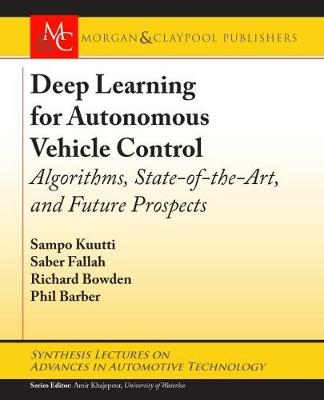
Deep Learning for Autonomous Vehicle Control
Morgan & Claypool Publishers (Verlag)
978-1-68173-607-5 (ISBN)
- Lieferbar
- Versandkostenfrei
- Auch auf Rechnung
- Artikel merken
The next generation of autonomous vehicles will provide major improvements in traffic flow, fuel efficiency, and vehicle safety.
Several challenges currently prevent the deployment of autonomous vehicles, one aspect of which is robust and adaptable vehicle control. Designing a controller for autonomous vehicles capable of providing adequate performance in all driving scenarios is challenging due to the highly complex environment and inability to test the system in the wide variety of scenarios which it may encounter after deployment. However, deep learning methods have shown great promise in not only providing excellent performance for complex and non-linear control problems, but also in generalizing previously learned rules to new scenarios. For these reasons, the use of deep neural networks for vehicle control has gained significant interest.
In this book, we introduce relevant deep learning techniques, discuss recent algorithms applied to autonomous vehicle control, identify strengths and limitations of available methods, discuss research challenges in the field, and provide insights into the future trends in this rapidly evolving field.
Sampo Kuutti received his MEng degree in mechanical engineering in 2017 from University of Surrey, Guildford, U.K., where he is currently pursuing a Ph.D. in automotive engineering with the Connected Autonomous Vehicles Lab within the Centre for Automotive Engineering. His research interests include deep learning applied to autonomous vehicles, functional safety validation, and safety and interpretability in machine learning systems. Saber Fallah is a Senior Lecturer (Associate Professor) in Vehicle and Mechatronic Systems at the University of Surrey and the Director of Connected Autonomous Vehicle Lab (CAVLAB) within the Centre for Automotive Engineering, where he leads several research activities funded by the UK and European governments (e.g., EPSRC, Innovate UK, H2020) in collaboration with major companies active in autonomous vehicle technologies. His research interests include reinforced deep learning, advanced control, optimization, and estimation and their applications to connected autonomous vehicles. Richard Bowden is Professor of computer vision and machine learning at the University of Surrey where he leads the Cognitive Vision Group within the Centre for Vision, Speech and Signal Processing. His research centers on the use of computer vision to locate, track, and understand humans. He is an associate editor for the journals Image and Vision Computing and IEEE TPAMI. In 2013 he was awarded a Royal Society Leverhulme Trust Senior Research Fellowship and is a fellow of the Higher Education Academy, a senior member of the IEEE, and a Fellow of the International Association of Pattern Recognition (IAPR). Phil Barber was formerly Principal Technical Specialist in Capability Research at Jaguar Land Rover. For over 30 years in the automotive industry he has witnessed the introduction of computer controlled by-wire technology and been part of the debate over the safety issues involved in the implementation of real-time vehicle control. Amir Khajepour is a professor of mechanical and mechatronics engineering at the University of Waterloo. He holds the Canada Research Chair in Mechatronic Vehicle Systems, and NSERC/General Motors Industrial Research program that applies his expertise in several key multidisciplinary areas including system modeling and control of dynamic systems. His research has resulted in many patents and technology transfers. He is the author of more than 400 journal and conference publications as well as several books. He is a Fellow of the Engineering Institute of Canada, the American Society of Mechanical Engineers, and the Canadian Society of Mechanical Engineering.
List of Figures
List of Tables
Preface
Introduction
Deep Learning
Deep Learning for Vehicle Control
Safety Validation of Neural Networks
Concluding Remarks
Bibliography
Authors' Biographies
| Erscheinungsdatum | 02.09.2019 |
|---|---|
| Mitarbeit |
Herausgeber (Serie): Amir Khajepour |
| Verlagsort | San Rafael |
| Sprache | englisch |
| Maße | 191 x 235 mm |
| Gewicht | 177 g |
| Themenwelt | Informatik ► Theorie / Studium ► Künstliche Intelligenz / Robotik |
| Technik ► Elektrotechnik / Energietechnik | |
| Technik ► Fahrzeugbau / Schiffbau | |
| ISBN-10 | 1-68173-607-1 / 1681736071 |
| ISBN-13 | 978-1-68173-607-5 / 9781681736075 |
| Zustand | Neuware |
| Informationen gemäß Produktsicherheitsverordnung (GPSR) | |
| Haben Sie eine Frage zum Produkt? |
aus dem Bereich


